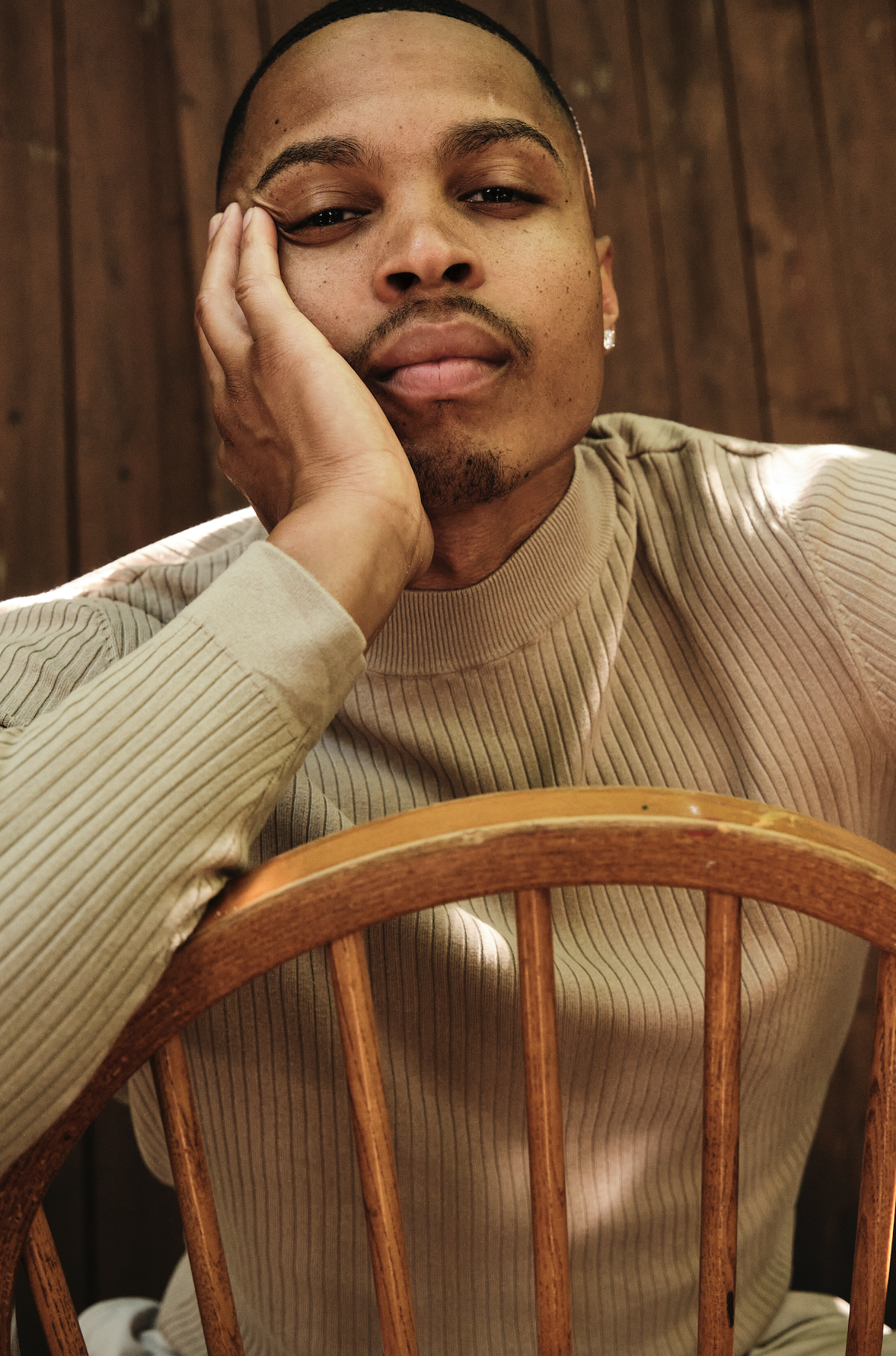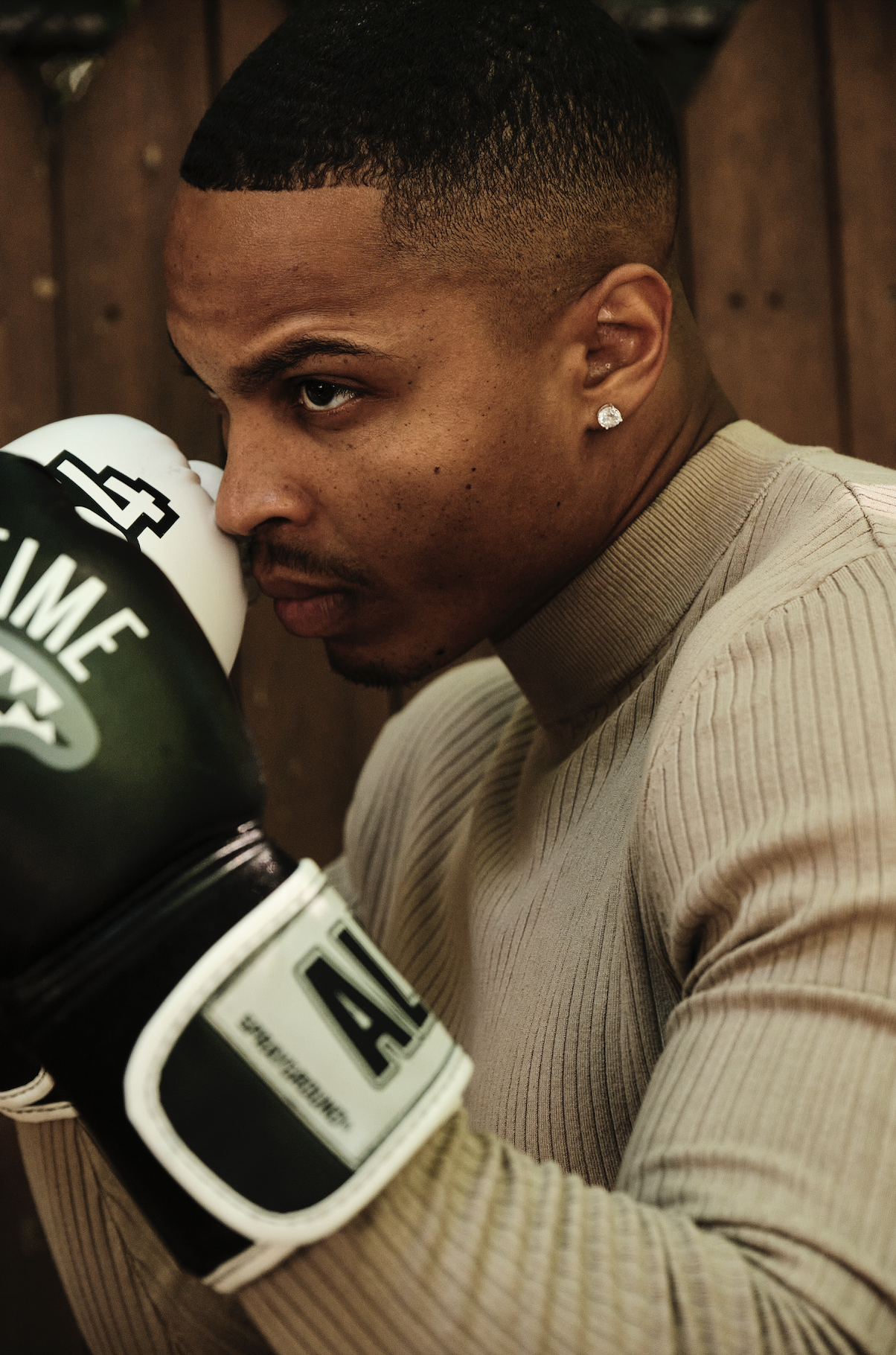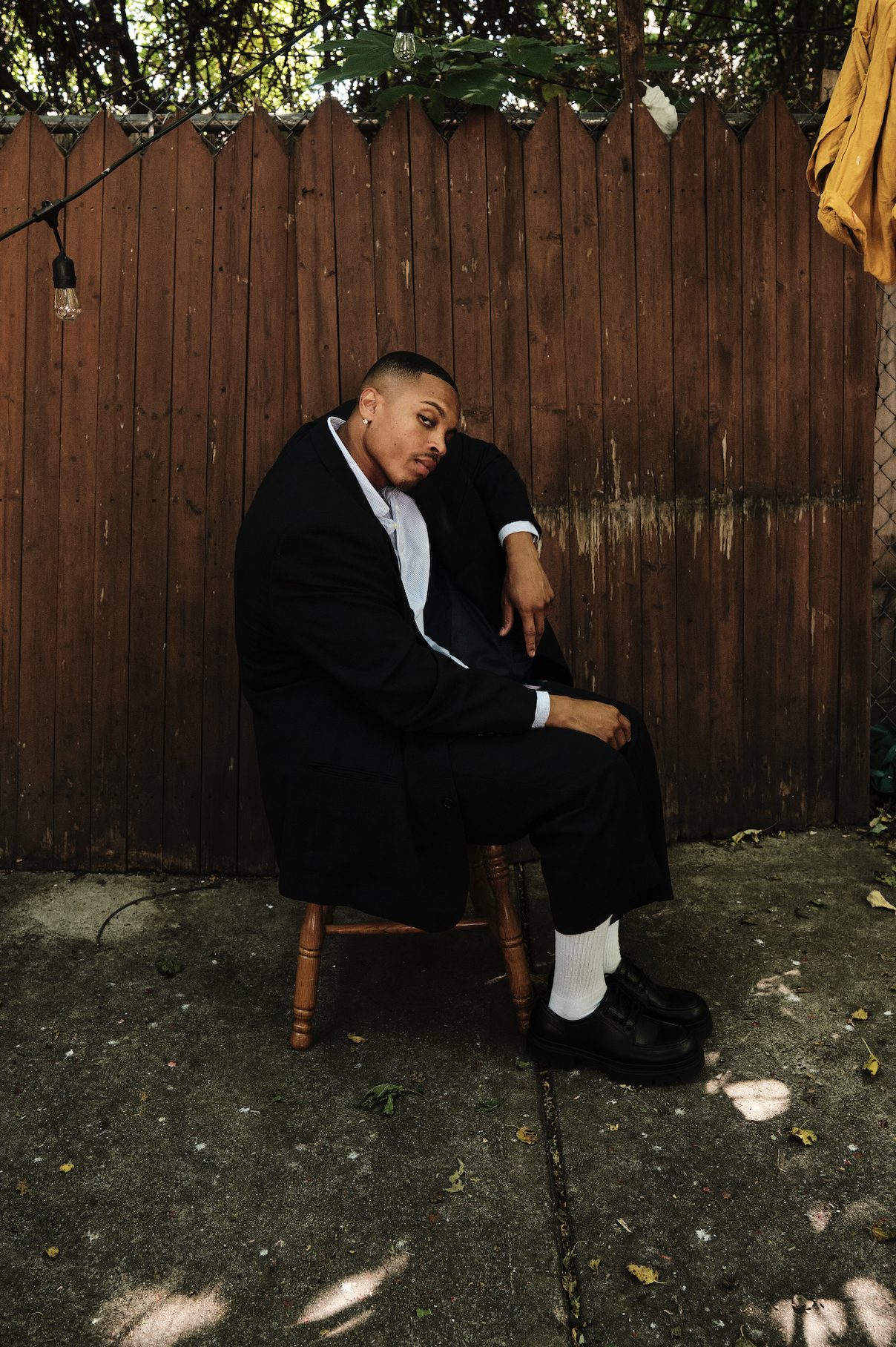Standing at the Edge: P-Valley and the Quiet Rise of Nicholas G. Sims
Photos by Tyler Henry
Before the world knows your name, there’s a rare kind of quiet — the stillness between preparation and recognition. It’s the moment where an artist sharpens their craft, rooted in faith, patience, and purpose. In this conversation, Our Era Magazine sits down with actor Nicholas G. Sims, who stands right at that edge — between anonymity and arrival — to reflect on gratitude, legacy, and what it means to honor the work before the spotlight hits.
You’ve said you’re standing at the edge between anonymity and recognition. What does that limbo feel like day to day?
That space between anonymity and recognition feels less like limbo and more like a kind of quiet grace. I never set out to be famous. What I wanted, and what I still want, is to honor the craft and the art form. Right now, I get to live in this rare moment where I can walk down the street, sit in a café, and take in the world without interruption, all while carrying a story inside me that the world has not yet seen. It feels like holding a secret, knowing something powerful is coming but not needing to rush it. My castmates have told me how different life becomes once a show takes off, and I am mindful of that. For now, I am simply grateful. Grateful to be in the work, grateful to be sharpening myself, grateful to love something as deeply as I love acting without being consumed by recognition. When the day comes that the world sees me, I will embrace it. For now, this space allows me to focus on what matters most: the craft, the discipline, the pursuit of truth in storytelling. My only real ambition is that when it is all said and done, people can look back and say I honored this art with everything I had.
What practices help you navigate the uncertainty of “almost there but not yet”?
Prayer and meditation are at the center of everything for me. They give me stillness, perspective, and grounding when the road ahead feels uncertain. Beyond that, I lean on my friends and castmates. Hearing their stories about the long, winding paths they took reminds me that this journey is never instant. It takes time. What inspires me most is witnessing others grow. Frances Turner, who I used to run auditions with, is now flourishing on Fallout, and seeing that has been incredible. Even closer to home, my dear friend Lamar Johnson was phenomenal in The Last of Us, and now watching him step into a whole new chapter with The Abandons has been inspiring. To see him blossom up close keeps me going and reminds me that when the time is right, doors open. I also look at artists like Teyana Taylor, who is now sharing the screen with Leonardo DiCaprio and Benicio Del Toro, and I see how the industry is shifting to create more space for voices like mine. That excites me. What helps me navigate this space is knowing that every day is part of the unfolding. Each opportunity to grow brings me closer to where I am meant to be. And as a man of color in this industry, I carry both gratitude and responsibility for the path I am walking.
Do you see value in this waiting period — the doubt, the grind — or does it feel like something you just have to survive?
I believe every part of this waiting period has value. The doubt, the grind, the sweat, the tears, all of it builds you, not just as an artist but as a human being. It equips you with the resilience and perspective to face life in its many layers. The trials and tribulations are not obstacles to avoid. They are the very things that shape and refine you. There is an old saying I hold close. God may place the plate before you, but you have to develop the appetite to receive it. That is what this season feels like. It is preparation, strengthening, becoming ready for the fullness of what is to come. So to me, this waiting is not something to merely survive. It is something to embrace, because it is carving out the person and the artist I need to be.
There’s often talk of the “Hollywood star” fading — what do you think a new generation of Black actors can bring to redefine that idea?
I think the idea of the Hollywood star fading is more complex than people often say. Even the studios are talking about how the days of one name being able to greenlight a film might be behind us. But when I look at this new generation of Black actors, what I see is a deep seriousness about the craft. There is a dedication, a multifaceted approach, that is pushing us into a new kind of stardom. We also have to move away from the notion of “us versus them” when it comes to Black actors from the United States and the UK. I am happy for all of us. I know how hard it is for Black artists anywhere in the world to break through, and I celebrate every victory. Whether it is Damson Idris, Stephan James, Danielle Deadwyler, or David Jonsson, what inspires me is that their rise is rooted in the work itself. It is about performance. It is about the craft. In that sense, I think we are living through something of a renaissance — a time where we can redefine stardom not by constant visibility or social media presence, but by depth of artistry. The greats before us like Sidney Poitier, Harry Belafonte, and Denzel Washington did not have social media. Their light came purely from the work. For this generation, the Hollywood star can be reignited by slowing down, choosing the work carefully, and letting the performance speak louder than the noise around it. That is how we redefine what it means to be a star today.
Do you feel pressure to represent more than yourself when you step into this industry?
Yes, I feel the pressure. But I resist letting it control me, because the truth is I can only be my full, authentic self. I do not enter this industry thinking in terms of image or career strategy. I think in terms of the craft. That is what grounds me. When I first stepped into P-Valley, I did not realize how big the show already was. I had not watched it, and I had no idea of its cultural reach. What drew me in was Katori Hall’s writing. Her voice on the page is extraordinary. She is a Pulitzer Prize winner, and her work deserves to be taken seriously. That is what I was chasing, not the popularity around the show. For me, it is always about the work. If I begin to make choices based on pressure or perception, I lose what is most important. My responsibility is not to represent some abstract idea of everyone, but to bring truth to the character in front of me. That is the only way I can honor the craft, and in doing so, I believe I can contribute something meaningful that resonates beyond myself.
What stories do you think young Black Hollywood is uniquely positioned to tell right now?
I think young Black Hollywood is uniquely positioned right now to tell stories that reach beyond trauma. For too long, our identity on screen has been reduced to pain, survival, and one narrative that does not represent the fullness of who we are. Those stories matter and must still be told, but they are not the only stories within us. We are stepping into a space where we can bend genres, reclaim worlds that once excluded us, and tell multilayered stories that reflect the range of our humanity. We can make space for joy, imagination, love, futurism, horror, comedy, and stories that honor our past while carving out new possibilities. For years we were pigeonholed. Now we are reclaiming the freedom to expand. And in doing so, we are showing the world that Black artistry is limitless.
P-Valley is already being called your breakout role. How does it feel to be stepping into that kind of anticipation?
Honestly, it feels like a blessing. To be in this position, to have people calling P-Valley my breakout role, is something I do not take lightly. First and foremost, I give all glory to God for every opportunity I am given. And I give deep thanks to Katori Hall for trusting me with a role this complex, this layered, this human. Her writing is powerful and it was her voice on the page that made me want to step into this world. Without giving too much away, I believe a lot of people, especially young Black men from my community and from other communities as well, will see themselves in my character. That is what excites me most. To know that this work can resonate, that it can hold up a mirror, is bigger than anything else. For this to be my first major role makes it even more meaningful. P-Valley is one of the most brilliantly crafted shows on television and I believe it deserves far more recognition from the industry than it has received. The writing, the performances, the direction, all of it should be standing shoulder to shoulder with the most celebrated shows out there. Of course there is a part of me that wonders how the world will perceive my character or how the industry may look at me after this role. But at the end of the day, I am an artist. I am a chameleon. I live for transformation. This role was both painful and exhilarating to play because of its complexity, and I am grateful that this is the project that introduces me on this scale. So above all, I feel joy. I feel gratitude. And I am excited for people to step into this story with me and see what we have created.
When you think about legacy, do you see yourself more as an actor or a storyteller?
I see myself first and foremost as a storyteller. I come from Mobile, Alabama, and I know that my ancestry is rooted in one of the greatest storytelling traditions in history. Folklore, folktales, oral histories, the passing down of wisdom and imagination — all of that came from the South. That runs through me in a big way. It has shaped how I see the world and how I see humanity. It has given me a lens layered with history, resilience, and creativity. Acting is the vessel I use, but storytelling is the spirit behind it. And I thank God that I have been given the ability to take that perspective and express it through the characters I bring to life. So when I think about legacy, it is not only about being remembered as an actor. It is about being remembered as someone who carried forward that tradition of storytelling, someone who honored his roots while expanding the way our stories are told.
How do you stay inspired when the industry feels like it hasn’t caught up to your vision yet?
I think all art shares a similar rhythm. Whether it is acting, music, or painting, there are always moments when the work is ahead of its time. Sometimes people have to catch up to a sound. Sometimes they have to grow into a visual image before they can understand its depth. Art does not always meet the audience where they are right away. For me, acting is no different. Every so often there is an artist whose choices may not be immediately understood, but with time those same choices can reveal a new truth. That is when people begin to see them in a different light, maybe even as a favorite. So I do not lose heart if the industry has not yet caught up to my vision. I continue to sharpen my craft and stay true to how I see life and how I tell stories. I remind myself that many of the greats had to walk that same path. Audiences eventually learned to meet them where they stood. At the end of the day, inspiration comes from trusting that the work itself will endure. If I keep painting on my canvas with honesty, the world will one day recognize the picture for what it is.
If Why I Act becomes the starting point of this moment for you, what do you hope the next chapter looks like?
I do not really look at life in moments, so I am not anticipating anything specific to come out of Why I Act. For me it began as an experiment, something I wanted to create with my brother Percival Bernard, who I have known since I was five. We just wanted to throw paint on the wall, to test ourselves, to capture what we were feeling in a time of chaos and uncertainty. What started as a playful commentary on how actors can take something small and turn it into something serious eventually became something symbolic. It became a piece that people can receive in many different ways, a piece that could shift perspectives. That transformation was part of the joy. So I am not thinking about the “next chapter” in a constructed way. What I do hope is that people can see from this short, even from something so small, that I am a bold artist. That I am willing to take risks with my work. That I am willing to step outside the lines and create in ways that might surprise people. I want audiences to understand that my art is not about fitting into one box. It is about expression, about constantly throwing paint on the wall, about trying to find new ways of telling the truth. When people watch P-Valley, I do not want them to only see the character. I want them to see me as an artist who is always experimenting, always searching, always willing to push the canvas further.
In an industry built on visibility, Nicholas G. Sims reminds us of something quieter — that greatness often grows in the unseen. Before the applause, before the fame, there’s the work: steady, intentional, and sacred. And if this conversation tells us anything, it’s that when his moment fully arrives, it won’t be by accident — it will be by devotion.





